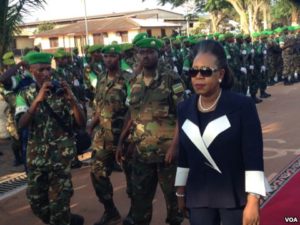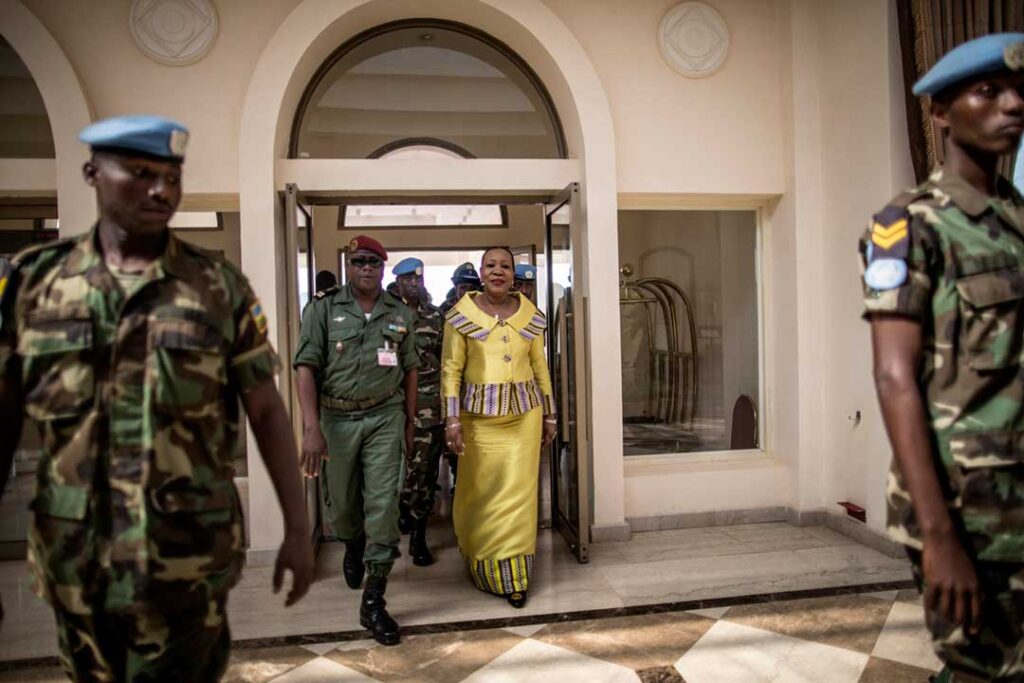Central African Republic: between two lines
New constitution stands little chance while CAR’s civil war simmers

On a Monday in late March 2013, after his Séléka rebels had seized control of Bangui, capital of the Central African Republic (CAR), Michel Djotodia made his first public address. In a recorded radio statement, he told the nation that deposed President Francois Bozizé, who had been in power for ten years, had turned the republic into a dictatorship. “I have decided that it is therefore necessary,” Mr Djotodia declared, “to dissolve the constitution of December 27, 2004, as well as the parliament and the government.” It was Mr Djotodia’s contention that Mr Bozizé’s misrule had violated the central principles underpinning the 2004 constitution. Chief among these was the tenet of zo kwe zo (“every human being is a person”). This Sango phrase was coined by the nation’s founding father Barthélemy Boganda, who sought equal treatment and civil rights for black people before CAR’s independence from France.
In dissolving the constitution, Mr Djotodia recalled the broken peace deal signed in January 2013 with Mr Bozizé in Libreville, the capital of nearby Gabon. This pact called for CAR to enter into a three-year power-sharing agreement with a prime minister drawn from the opposition. But the rebels maintained that the government had violated the accord’s terms that called for releasing political prisoners and removing foreign troops. Due to Mr Bozizé’s intransigence, the rebel leader reminded the nation, the Séléka had been left with no option but to resume fighting. On the eve of his victory, Mr Djotodia released a terse statement that illuminated how he would govern: “During [the] transition period which will lead us to free, credible and transparent elections, I will legislate by decree.” In the two years since that announcement, CAR, one of the poorest countries in the world, has not seen a single month of stability.
A rapid escalation in sectarian violence between the largely Muslim Séléka and a hastily convened Christian rebel group known as the anti-Balaka (Sango for “antimachete”), forced Mr Djotodia to resign as interim president in January 2014. Despite the intervention of troops from France, the European Union and the African Union, and the arrival of the UN blue helmets in September 2014, Mr Djotodia’s replacement, Catherine Samba-Panza, has hardly fared better. An interim legislative council (CNT) adopted a transitional constitution and then elected Mrs Samba-Panza, the former mayor of Bangui. She was selected from a list of eight candidates, each of whom had to prove that they had no links to either the Séléka or anti-Balaka. While her reluctance to reinstitute the 2004 constitution is directly tied to the tainted legacy of the Bozizé regime, Mrs Samba-Panza has stated that the conflict—which has displaced almost 1m people, or a quarter of CAR’s population—is a result of a “failure of governance”.
Does the new draft constitution, submitted for discussion to the transitional assembly’s 135 councillors in February 2015, herald the end of the bloodshed? International observers are not hopeful. The actions of foreign governments with troops in CAR are “inconsistent” with their avowed aims to bring peace, suggested Thierry Vircoulon, the project director for central Africa for the International Crisis Group (ICG), in an interview with Paris-based news magazine Courrier International published on March 8th. As Mr Vircoulon reminded readers, the international community claims to be in favour of a political process that includes the disarmament of all rebel groups, discussions around the draft constitution and a referendum leading up to general elections in mid-2015. But in early March the French defence minister announced that Operation Sangaris (the official name for the French military force in CAR) would be reduced by 300 troops, while EU forces would be pulling out entirely by March 15th.
The maths, according to the ICG, a Brussels-based think-tank, is as disheartening as it is simple: the rebels are showing no signs of disarming themselves; and the Western powers, for all their firepower and statements of intent, have not disarmed the rebels. While the draft constitution may bear the hallmarks of respect for diversity and basic human rights, the transitional government has little hope of applying it in a war zone. In early February 2015, Alexandre- Ferdinand Nguendet, who heads the transitional assembly, said the document was “in line with the requirements of the international community, which insists on speeding up of transition”. Shortly thereafter the document was released to the public. Its text enshrines CAR’s national motto, “unity, dignity and work”, while declaring that every citizen is “equal before the law regardless of race, ethnicity, region, sex, religion, political and social position”.
CAR’s citizens should vote on it in a referendum scheduled for June, just as this magazine was going to press. Parliamentary, presidential and local elections are due to take place in two rounds, in July and August, but delays are likely. Of course, for CAR to move from this transitional phase to a properly elected and fully accountable government, the country’s two main rebel groups must subscribe to the vision.
RICKETY FRAMEWORK
This writer, who was in CAR in August 2014, sees little reason for optimism: since then the criminal activities of the anti-Balaka in Bangui have become more entrenched, according to the ICG and other independent observers. In the meantime, the Séléka are confined to their barracks as per the policies of the foreign peacekeepers. Nonetheless these rebels remain fully armed, thus providing the anti-Balaka with an excuse for their unlawful raids on civilian targets. Meanwhile, Lieutenant-Colonel Pierre-Yves Sarzaud, spokesman for Operation Sangaris, informed this reporter last August that disarmament was “not part of his mission”. This attitude seems to have rubbed off on the UN. The blue helmets outnumber the French: 9,285, including 1,196 police, against 1,700, as of February 28th. But the UN troops, contrary to the wording of their own resolution, act as though they are not mandated to disarm the rebels, Mr Vircoulon pointed out.
In light of these inconsistencies, the new constitution, even if it is adopted after the national referendum in June, will have a negligible effect. Those familiar with CAR’s brutal post-independence history know that a progressive legal framework has never been more than a sop to neoliberal sensibilities. The 2004 constitution was ratified a year after Mr Bozizé ousted Ange-Félix Patassé in a coup. That document was also conceived during a transitional government. It too was “[convinced] of the urgent necessity to preserve national unity and peace”. Its preamble boasted of a “pluralistic democracy” that guaranteed “the security of persons and of property, the protection of the most weak, notably vulnerable persons, the minorities”. But such phrases were clearly worth less than the paper on which they were written. Mr Bozizé, it will be remembered, was briefly detained at a German airport in 2004 with a briefcase full of diamonds.
Reports are rife of his looting of the country’s resources from those areas richest in minerals and poorest in infrastructure. Shortly after his ousting in 2013, human skeletons were discovered beneath the tiled garage flooring of his Bangui home. Few CAR citizens were surprised. While Mr Bozizé’s 2004 constitution may have highlighted the principle of zo kwe zo, this principle perished with Mr Boganda in a mysterious plane crash in 1959. To break this cycle, the new constitution will need to do more than acknowledge that “every human being is a person”. It will need to demonstrate the reality of this standard via legislative (and punitive) interventions.



